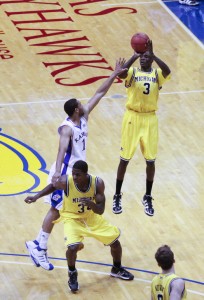“You can practice shooting eight hours a day, but if your technique is wrong, the all you become is very good at shooting the wrong way. Get the fundamentals down and the level of everything you do will rise.”
It turns out that the person who said that, Michael Jordan, was pretty good at the fundamentals of basketball. It was his mastery of the fundamentals that allowed him to acquire a tremendous level of “intangibles” that when combined with his innate desire to be successful helped make him arguably one of the best basketball players ever.
One of the basic fundamentals in the game of basketball is understanding the different positions of players and putting the best players in their spots based on strengths and weaknesses. Let’s look at the fundamental positions and what skills or attributes each player brings to their team.
 Point Guard – This player should always be in control. They usually touch the ball on every possession so they are considered the floor leader. The point guard is usually an extension of the coach and helps execute the plays on both ends of the floor. This person must understand every other players role and must avoid costly turnovers which could affect the team’s ability to score and win the game.
Point Guard – This player should always be in control. They usually touch the ball on every possession so they are considered the floor leader. The point guard is usually an extension of the coach and helps execute the plays on both ends of the floor. This person must understand every other players role and must avoid costly turnovers which could affect the team’s ability to score and win the game.
In a business like real estate, where the “independent contractor” title is waved around an immunity idol on Survivor, most agents need to possess this “point guard” mentality. The business needs to feel like it is always in their control and their ability to dictate the pace of the action will allow them plenty of chances to score.
Shooting Guard – This player is constantly in motion. They are trained and should be good at finding the open spot on the floor. A shooting guard should be versatile as they will usually be guarding the other team’s best player. As a “main weapon” on the offensive end of the floor, they must be unafraid to keep shooting, even when they are missing shots.
The days of an agent sitting back and waiting for business to come to them may return but those who find the will and determination to go out and seek their own business will have much more control of their results. The ability to go from a $150,000 buyer to a $750,000 listing appointment will maximize the players chances to close deals regardless of market conditions.
And just like the basketball player, continuing to focus on business development activities is the quickest way out of a slump. Hearing the word “no” should not stop you. Just think of it as “not yet” and continue to make efforts to build new or deeper relationships and schedule appointments.
Small Forward – These players must be strong because they will end up taking lots of abuse during a typical game. They must sacrifice their body “in the paint” seeking to draw charges from their opponents and scrapping for loose balls and rebounds. They must have a great court awareness because the changing landscape of basketball requires them to play both inside with the big physical players and outside with the speedier, quicker athletes.
Think of all the things in your daily routines that no one wants to do. Yet you and I both know that they need to get done in order to maximize the chance of success. It really takes a focused determination to the business to learn the areas where you can leverage strengths and minimize weaknesses.
 Power Forward – These players really make things happen. They defend against their opponents game plan and put themselves in positions to protect their own teams opportunity to score. Another big aspect of a power forward is helping others get open for scoring chances. They fight through picks and “pound the glass” on one end of the court while digging deep into their toolbox of skills at the other end of the floor where they are asked to do a little of everything – pass, pick, shoot and crash the boards for the offensive rebounds.
Power Forward – These players really make things happen. They defend against their opponents game plan and put themselves in positions to protect their own teams opportunity to score. Another big aspect of a power forward is helping others get open for scoring chances. They fight through picks and “pound the glass” on one end of the court while digging deep into their toolbox of skills at the other end of the floor where they are asked to do a little of everything – pass, pick, shoot and crash the boards for the offensive rebounds.
Are you in control of your business? Do you allow others to dictate your schedule or how you do things? When it comes to negotiating, are you leveraging your clients position by anticipating where your opponent will go next? Just like in basketball, you don’t necessarily have to jump higher to get a rebound, you just have to be smarter to anticipate where the ball is going to bounce when the shot misses.
Center – This player, usually the tallest on the court, needs to get things going right from the beginning by “winning the jump.” Their height allows them to have a great vision of the court and they can usually identify the open player to exploit the defense. They are responsible for “flipping the court” in their favor – grabbing the rebound off an opponent’s missed shot and delivering a quick outlet pass to a teammate who can start a fast break the other way, taking advantage of a surplus of players.
How’s your “court vision”? Do you stand tall among your fellow players and survey the landscape of what the market doing? Are you ready to block your opponent without fouling them so you maximize your team’s chances or can you secure the loose balls and missed shots and turn them in to points?
6th Man – Sure, every team have 5 starting players but no team is truly complete without a go to player who comes off the bench. This person beings a great deal of energy to the team and the fans, providing a needed spark of energy when the situation might be difficult. Having just left the bench, this player often carries a message or a reminder from the coaching staff which allows the team to make adjustments to their plan. Depending on this player’s size and skills, it may drastically change the dynamic of the team from a “fast team” to a more physical team, or from an offensive minded unit to a shut down defensive squad.
What type of energy are you bringing to the floor each day? Does your ego allow you to “come off the bench” and not always be the star yet contribute to the greater good of the team? When you watch the game evolve from the sidelines, does that help you make better decisions once you start playing? How quickly can you change your style of play to better serve and represent different clients?
 Bench Players – Let’s not forget the rest of the team that fills the bench. These players are critical for support of the “starting players” both during game time as well as in practice situations. They should be ready at any given time to enter the game and often, they are simply waiting for an opportunity to show what they can do.
Bench Players – Let’s not forget the rest of the team that fills the bench. These players are critical for support of the “starting players” both during game time as well as in practice situations. They should be ready at any given time to enter the game and often, they are simply waiting for an opportunity to show what they can do.
If you’re already a “star” now, are you supportive and appreciative of your bench? They are working hard to make you better each day in practice and the energy they provide will be helpful throughout the season. If you feel like a bench player now, remember that very few people started as a star. It takes hard work and determination and a dedication to the fundamentals if you want to “get in the game” and have a chance to show the world what you can do.
Call a “time out” and assess what your role is. What position do you need to play today? Perhaps you need to play a lot of different roles, depending on your current transactions and/or clients. But wherever you are on the court, will you be ready to take the shot that could win you the game?